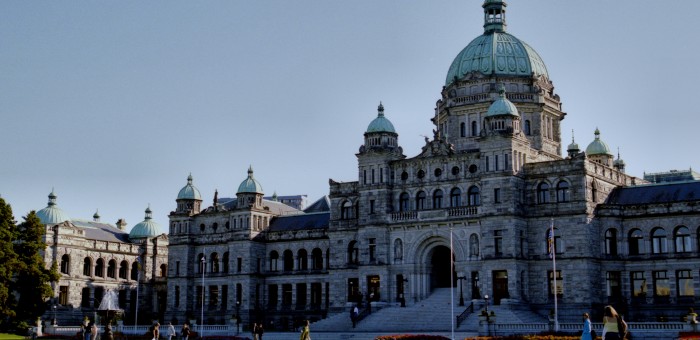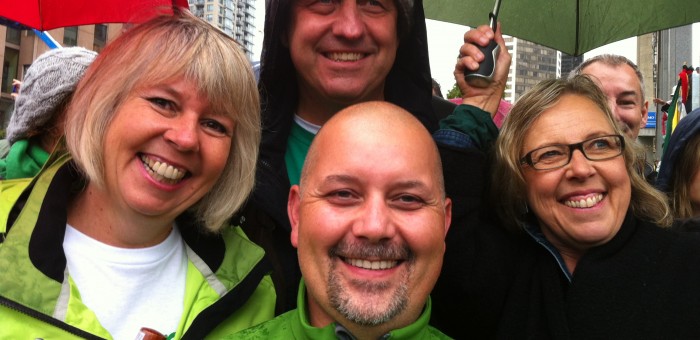Community Blog
B.C. Government to Apologize to Chinese Community for Historic Wrongs
Andrew Weaver commends the Government of British Columbia for announcing today that it will launch a consultation process to discuss the wording of a formal government apology to B.C.’s Chinese community for historical wrongs.
In making this announcement, the government has acknowledged that for more than 60 years, from 1885 to 1947 the Chinese community in B.C. suffered legislated inequality and discrimination, most notably under the Chinese Immigration Act and Chinese Exclusion Act.
Over the coming months, Teresa Wat, Minister of International Trade and Minister Responsible for the Asia Pacific Strategy and Multiculturalism will travel to communities throughout the province to consult with Chinese community associations and citizens to identify appropriate wording for a formal apology.
Andrew Weaver applauds the B.C. government for taking the necessary steps to recognize and apologize for these past wrong-doings and looks forward to supporting Minister Wat as she meets with Chinese cultural groups in Oak Bay and Gordon Head.
The Chinese community has been an integral part of Oak Bay and Gordon Head for over 100 years and has contributed significantly to the development of our community’s rich and vibrant cultural history. The Chinese Cemetery is one of many examples of this. In 1903 the Chinese Consolidated Benevolent Association purchased 3.5 acres of land at Harling Point in Oak Bay and established the Chinese Cemetery. Today the cemetery hosts the remains of hundreds of Chinese-Canadian pioneers and in 1994 was declared a National Historic Site by the Government of Canada.
If you would like to contribute your recommendations regarding the wording of the formal apology, please call my office at 250-472-8528 or send me an email.
Apply for the BC Youth Parliament
The British Columbia Youth Parliament’s 85th Parliament will be held in Victoria at the Provincial Legislative Chambers from December 27 to 31, 2013. The Youth Parliament is a province-wide non-partisan organization for young people ages 16 to 21. It teaches citizenship skills through participation in the December parliamentary session and in community service activities throughout the year. Youth Parliament is a one year commitment.
The BC Youth Parliament is non-partisan, and applicants need only be interested in learning more about the parliamentary process and in serving their community.
The application form is available here, along with an informational brochure and poster.
All application forms must be received by October 23, 2013. Selected applicants will be notified in early November. For more information, please click here.
ADHD Awareness Week
Victoria BC – As ADHD Awareness Week continues, Green Party MLA Andrew Weaver is calling for more comprehensive ADHD screening, support and early treatment for children and adults to help address a disorder that is having a significant impact on patient’s health and costing our economy billions.
According to the Centre for ADHD Awareness Canada (CADDAC), ADHD has significant economic consequences, not just for individuals but for Canada. “Canada loses an estimated $6 billion to $11 billion annually through loss of workplace productivity.”
Meanwhile, a British Columbia Medical Association report cites a study that estimates “the average incremental annual cost to educate a child with ADHD from kindergarten to grade 12 is more than 18 times that of non-ADHD children.”
In 2010 CADDAC produced an ADHD Report Card that rated each province according to how ADHD is handled in the school system. British Columbia was one of only 2 provinces to receive an “unsatisfactory/fail” grade.
Comprehensive, early screening can be an effective tool for supporting individuals and their families as they work with the symptoms associated with ADHD.
October 14th to 20th is Attention Deficit Hyperactivity Disorder (ADHD) Awareness Week in Canada. The week aims to help raise awareness of the impact ADHD has on individuals and their communities. For more information on events supporting ADHD Awareness Week, please visit BCADHD.com:
Resources:
Newswire: Economic impact of ADHD in Canada
BC Medical Association 2009 ADHD Report
Provincial comparison of youth ADHD diagnosis and treatment
Walk for Reconciliation: A New Way Forward
The Walk for Reconciliation was held in Vancouver, BC on September 22, 2013 – with a purpose to transform and renew the very essence of relationships among Aboriginal peoples and all Canadians. Seventy thousand were in attendance and a keynote address was delivered by Dr. Bernice A. King, daughter of Dr. Martin Luther King, Jr., on the 50th anniversary of the “I Have a Dream” speech.
Andrew Weaver spoke today at the Union of British Columbia Municipalities Convention in Vancouver
Andrew Weaver — UBCM Speech
September 19, 2013
Two years ago, if someone had said to me that I would be standing before the UBCM as Deputy Leader of the Green Party of BC and elected MLA for Oak Bay Gordon Head, I would have told them that they were crazy. But here I am, and what a thrilling journey it has been.
May 14, 2013 saw a change in BC’s political landscape. It saw the emergence of another choice for the voters of British Columbia. The Green Party of BC offers British Columbians a new vision for our future — A vision that transcends the traditional political boundaries spanning the right versus left spectrum. It is a vision for a compassionate society that lives within its means while preserving the environment around us. It is a vision that guides us to think about the long-term consequences of the decisions we make today.
The transition from scientist to Green Party of British Columbia politician hasn’t been as difficult as I thought it would be. In science, we identify a problem or challenge and seek a solution to that problem or challenge based on the available evidence. We don’t start with the solution and seek evidence to support it after the fact.
The Green Party of BC is a solutions-oriented party — one that fundamentally believes that policy should flow from evidence. I like to call this evidence-based decision-making, as opposed to what happens too often in politics today — decision-based evidence making.
For the Green Party, being a member of the opposition is about more than opposing government policy for the sake of it — it’s about addressing the issues and working in a non-partisan fashion to advance good policy.
The fact is, very few of the important challenges facing our society can easily be placed within the traditional left-right political spectrum. Addressing these challenges requires us to come together from across the political divide. It requires us to cooperate and collaborate across all levels of government. And it requires us to develop a social license before, not after, a policy pathway is chosen.
The Green Party of BC believes that small business is the engine of our economy. We believe that basing budget projections on hypothetical LNG revenues is to risk subjecting BC’s economy to the boom and bust roller coaster of global fossil fuel pricing, with all its twists, turns and drops. To attempt to lay all our eggs in this one basket, in the hope — the desperate hope — that we will be the one exception — the one jurisdiction that will defy history and economics— is to base our future on very unstable ground.
Yet even if we defy the odds and coast through the boom and bust cycles, we cannot achieve our provincial greenhouse gas targets while we double down on LNG. We will have no choice but to abandon our continent-leading climate commitments. That’s not politics — it’s science. And the numbers just don’t add up. The greenhouse gas emissions associated with LNG development are simply too high to allow us to meet these targets.
I believe our province is headed in the wrong direction, and it is up to us to redirect its course. We’re following a path fraught with risk. It’s a pathway that puts the interests of major multinational energy corporations motivated by short-term profit ahead of British Columbians and their long-term interests. My question to you is this: Will BC’s hypothetical, risky adventure into LNG actually benefit your communities in the long-term? I think not.
And I think talk of BC becoming a major LNG exporter is nothing more than a pipedream.
Canada has less than 1% of the world’s proven natural gas reserves.
Russia has about 20 times as much natural gas as all of Canada combined and recently signed long term export agreements with China. Russia can transport its gas to China via pipeline and does not need to undergo the costly process of liquefying the gas for tanker transport.
Australia has similar-sized shale gas reserves as Canada and is much further ahead in the development of its LNG industry. Yet several of their new projects have been put on hold citing concerns over cost.
The United States has more than twice the shale gas reserves as Canada and the US government recently decided to allow natural gas export. The US already has some of the necessary infrastructure in place on their coastline to facilitate a relatively quick development of an LNG export industry.
China could soon be well positioned to take advantage of its own natural gas reserves, which are 3 times the size of Canada’s.
The fact is, we need to grow and stabilize our economy. But the government’s solution will not do this — it will not address this economic challenge. Nor will it address the challenge that Stephen Lewis just yesterday described as the greatest threat that we face today — climate change.
So here’s another solution. We don’t have to go all in and then double-down on LNG. We could invest in the economy of tomorrow instead of the economy of yesterday. We could follow the leadership of Germany, California and now the United States as a whole or even China. We could position ourselves as leaders in the clean tech sector – the sector responsible for the generation, transportation, storage and end-use of renewable energy. This is a sector that creates stable, high paying, jobs in communities throughout British Columbia, not just in one or two locations.
We already have the industry, the expertise and the capital, and we were once considered emerging leaders in this area. But now what we lack is clear government leadership. In the US, for example, job growth in the clean tech sector is growing at four times the rate of all jobs. And that’s a Jobs Plan you can take to the bank.
Stable, local jobs give rise to vibrant, resilient municipalities. Yet, building strong municipalities is about more than making smart economic choices at the provincial level. It is also about ensuring that municipal governments are empowered to make the investments their communities need. It is about asking ourselves: “How do we finance our municipalities now and how might we better finance them in the future”.
No one knows this better than our new interim leader, Adam Olsen, a former municipal councilor from Central Saanich.
The Green Party of BC is delighted by the unanimous UBCM vote yesterday in support of the Strong Fiscal Future Policy Paper. We also believe that it’s critical to immediately initiate a provincial dialog on the future of municipal financing. Is continuing to burden homeowners with property tax increases year after year really the best approach? Or, could provincial and municipal governments instead work together to create a more progressive financing system that promotes, instead of impedes, the type of fundamental economic activity that we all value, such as buying a home.
I’m asking everyone in this room to consider working together to find real solutions to the important problems that face us today. When Stephen Lewis says that we have the most lunatic political culture in Canada we all laugh. But quite frankly, I think we should all be ashamed.
While I may disagree with the government in their approach to LNG, I am committed to work with them to find more practical solutions for the betterment of all British Columbians. There is a lot of work to be done and a lot of potential to be realized. But together, we can move our communities forward by investing in stable, local jobs and strong municipal governments.
Achieving this goal requires hard work and cooperation across all levels of government, willingness to work across political differences and a focus on evidence-based decision-making. It’s not going to be easy, but it is possible. Together, let’s forge this path to the future.
Thank you and thank you to the UBCM for giving me the opportunity to present to you today.












